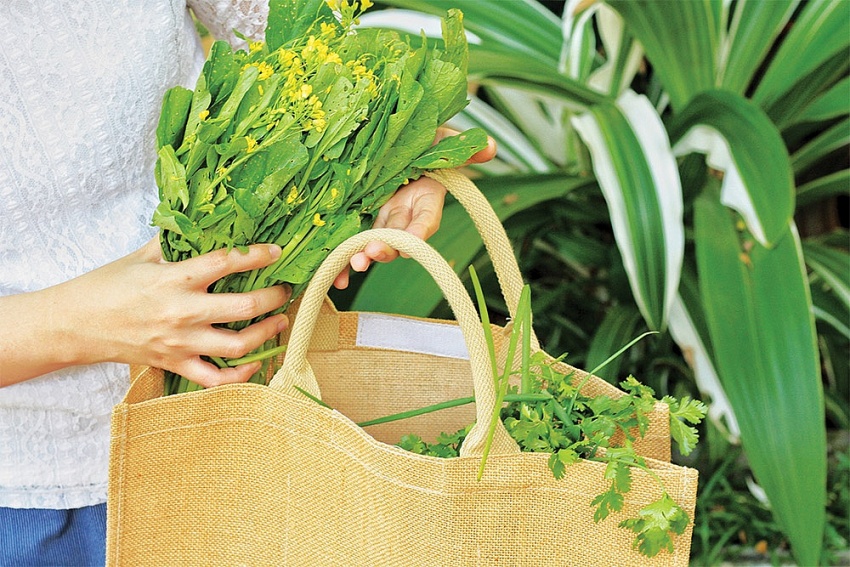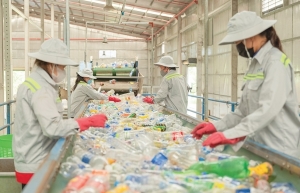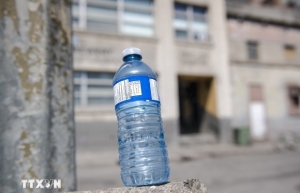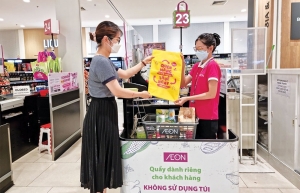Supportive policies crucial for retail plastic reduction
 |
| Supportive policies crucial for retail plastic reduction, Photo: Shutterstock |
The issue was highlighted at a seminar on reducing plastic use organised by the Institute of Strategy and Policy on Natural Resources and Environment (ISPONRE) under the Ministry of Natural Resources and Environment (MoNRE), attended by key retailers, regulatory agencies, and experts in environmental and sustainable development in Vietnam on July 30.
Huynh Thi Truc Ly, marketing team leader at Co.op Mart Tuy Hoa, observed that many customers heavily rely on supermarket promotions. “Most customers do not proactively bring their own bags. They usually opt for reusable bags when supermarkets offer incentives,” said Ly.
While retailers face increasing pressure to shift consumer habits towards sustainability, the supporting economic framework has yet to catch up.
Addressing these gaps, Nguyen Trung Thang, deputy director of the ISPONRE, said, “Vietnam has not yet imposed taxes on single-use plastics to favour ecological alternatives, and support mechanisms for these alternatives remain difficult for businesses to access due to administrative challenges.”
Reducing plastic bag use is part of a broader strategy, with businesses now focusing more on alternative plastic products to manage waste.
As a producer and distributor of dairy products, TH Group is cutting plastic packaging by removing shrink wrap and reducing plastic on labels and bottles.
Since 2018, the group has steadily committed to plastic alternatives with its eco-friendly yogurt spoon initiative, achieving a 50 per cent reduction in plastic spoons by 2022. By 2024, TH reduced plastic use by 600 tonnes per year in its production and business facilities. A TH True mart representative said, “In the near future, TH Group plans to completely stop supplying single-use plastic spoons for yoghurt products.”
Domestic enterprises like BUYO Plastics are also pioneering in applying sustainable solutions and demonstrating the potential of local organic plastic alternatives.
CEO Do Hong Hanh said, “The recycling infrastructure in Vietnam is still underdeveloped, so there is significant potential for biodegradable products rather than recycled ones. Our company’s biodegradable plastics also address the issue of compostable bags, leaving microplastics after decomposition.”
So far, BUYO’s key markets are primarily international due to domestic policy constraints, as Vietnam lacks policies to support the commercialisation and price competitiveness of new plastic alternatives, Hanh said.
“Recently, with a revised regulation on packaging and related waste, the EU has recognised the role of bio-based materials as equivalent to recycled materials. In the United States, non-degradable plastic products are virtually banned. These regions also impose taxes on single-use plastics. A similar tax on single-use plastics in Vietnam could level the playing field for domestic producers like BUYO.”
Aside from the lack of tax support policies, the development of a supportive regulatory and incentive framework for plastic alternatives is still in its early stages.
Regarding communication strategies on plastic reduction in Vietnam, the campaign on promoting plastic waste reduction is expected to be strengthened with the formation of the Retailers’ Alliance for Plastic Waste Reduction, established by the ISPONRE in 2021. To date, there are still regulatory issues that need to be resolved to promote efficient operation.
Nguyen Thuy Anh, a communication specialist at the International Union for Conservation of Nature, said, “The alliance has not yet covered the entire retail system in Vietnam, and has not attracted all members to participate in plastic reduction activities. This raises policy issues on how to make it more coordinated, draw in retailers to act together, have incentives for proactive retailers, and specific measures for those who do not act.”
“If businesses have clear directions, specific goals, and stricter management mechanisms, they will be more aware of their responsibilities and ready to take action towards the reduction goal.”
Additionally, current efforts are not effectively encouraging immediate and sustained consumer action. Tran Hong Diep, deputy director of the For Vietnamese Stature Foundation, a non-profit organisation focus on sustainable development goals, said, “Our survey indicates that messages on plastic waste reduction lack depth and urgency. Without addressing these gaps, influencing consumer behaviour with environmental initiatives may be difficult.”
In the long-term vision, regulatory and supportive mechanisms to synchronise plastic waste reduction solutions are being set as a key task in the National Action Plan for Circular Economy by 2030, as proposed by the MoNRE.
 | Unilever Vietnam striving to implement sustainable EPR The active cooperation between Unilever and various recyclers and collectors regarding extended producer responsibility regulations has cemented its determination to promote the plastic economy and accelerate sustainable development. |
 | Malaysian official urges collective efforts in plastic waste fight A Malaysian official has underlined the importance of collective efforts, particularly by the public, in promoting the use of reusable bags and reducing single-use plastics in the fight against plastic waste. |
 | Younger generation gravitates to green initiatives Campaigns promoting environmental protection and encouraging a shift towards green consumption are gaining significant traction among young people. |
What the stars mean:
★ Poor ★ ★ Promising ★★★ Good ★★★★ Very good ★★★★★ Exceptional
Related Contents
Latest News
More News
- Trung Nam-Sideros River consortium wins bid for LNG venture (January 30, 2026 | 11:16)
- Vietnam moves towards market-based fuel management with E10 rollout (January 30, 2026 | 11:10)
- Envision Energy, REE Group partner on 128MW wind projects (January 30, 2026 | 10:58)
- Vingroup consults on carbon credits for electric vehicle charging network (January 28, 2026 | 11:04)
- Bac Ai Pumped Storage Hydropower Plant to enter peak construction phase (January 27, 2026 | 08:00)
- ASEAN could scale up sustainable aviation fuel by 2050 (January 24, 2026 | 10:19)
- 64,000 hectares of sea allocated for offshore wind surveys (January 22, 2026 | 20:23)
- EVN secures financing for Quang Trach II LNG power plant (January 17, 2026 | 15:55)
- PC1 teams up with DENZAI on regional wind projects (January 16, 2026 | 21:18)
- Innovation and ESG practices drive green transition in the digital era (January 16, 2026 | 16:51)

 Tag:
Tag:




















 Mobile Version
Mobile Version